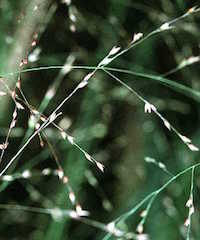A research team led by the University of Georgia has discovered that manipulation of the same gene in poplar trees and switchgrass produced plants that grow better and are more efficiently converted to biofuels.
Due to the composition of plant cell walls, plant material can’t be efficiently broken down into basic sugars and converted to biofuels. In a paper published in Nature Biotechnology, the researchers report that reducing the activity of the GAUT4 gene leads to lower levels of pectin in the plant cell wall. Pectin is a component of the plant cell wall responsible for the plant material’s resistance to deconstruction.
“It’s expensive to produce biofuels,” said lead author Debra Mohnen, a member of UGA’s Complex Carbohydrate Research Center (CCRC) and professor of biochemistry and molecular biology in the Franklin College of Arts and Sciences. “It takes a lot of energy to break open plant biomass with a pretreatment process involving chemicals, high temperatures and enzymes that break complex polymers into smaller sugars that can be turned into fuels. Even relatively modest increases in the efficiency of deconstruction can be important on an industrial scale.”
The research team included Adam Bray, Zachary King, Peter LaFayette and Wayne Parrott, all of the Institute of Plant Breeding, Genetics and Genomics, a unit of the UGA College of Agricultural and Environmental Sciences (CAES). Parrott is a CAES professor and crop breeder, and LaFayette is a CAES research technician in the UGA Department of Crop and Soil Sciences. Now CAES graduates, Bray is working on a doctorate at the University of Missouri and King is a corn breeder for Monsanto. The team included researchers at six institutions.
Collectively, the scientists found that reducing the expression of GAUT4 in poplar and switchgrass led to a 70 percent reduction in pectin content and produced a 15 percent increase in sugar released. Unexpectedly, it also led to an increase in the growth of both plant species, an added benefit.
“We increased the amount of biomass yield of field-grown switchgrass sixfold, and we increased the amount of ethanol yield sevenfold per plant,” Mohnen said. “We also observed increased growth and sugar release in poplar.”
The increase in plant yield and sugar release — demonstrated in both greenhouse and field trials for switchgrass — bodes well for creating biofuels, an important alternative to fossil fuels. Switchgrass and poplar have been identified by the U.S. Department of Energy as two biofuel feedstocks that can be grown on land that would not profitably support food crops.
The team also explored the mechanism behind the results, producing the first evidence that a reduction in GAUT4 specifically reduces two of the three types of pectin in plants. The influence of pectin on biofuel production has largely been ignored, according to the paper’s first author, Ajaya Biswal, assistant research scientist at the CCRC. In research that began more than a decade ago, Biswal found GAUT4 expressed in poplar and then targeted the gene in both poplar and switchgrass.
“We tend to forget that understanding the mechanics and wall structure of a plant like switchgrass is a long journey,” he said. “Mother Nature took millions of years to build it, and fully exploring it in 10 years is impossible. We still have so much more to learn.”
For this study, UGA researchers joined with scientists from the DOE BioEnergy Science Center, Oak Ridge National Laboratory, University of Tennessee (UT), ArborGen and the National Renewable Energy Laboratory. The paper is available online at www.nature.com/articles/nbt.4067.







